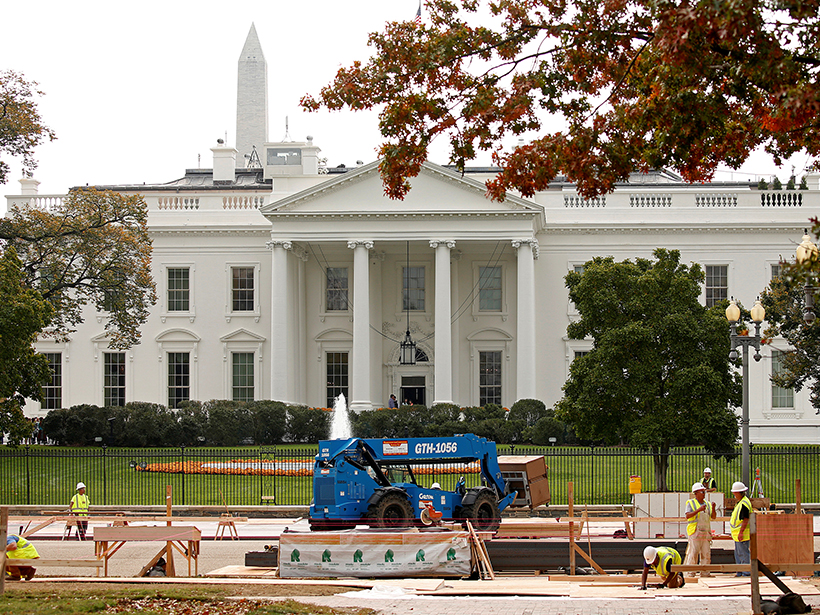“Science has always to some extent been a bipartisan issue. It should continue to be a bipartisan issue,” White House science adviser John Holdren told Eos on 15 November in some of his first public remarks about the role of science since the election last week of Donald Trump as the next U.S. president.
Holdren, who directs the White House Office of Science and Technology Policy, spoke to Eos following remarks he gave at a workshop that day on “Sustaining Ocean Observations to Understand Future Changes in Earth’s Climate,” held at the National Academy of Sciences (NAS) in Washington, D. C. In those remarks, Holdren defended climate science and warned about the impacts of climate change.
Several former federal officials at the workshop, including a former administrator of the National Oceanic and Atmospheric Administration (NOAA), told Eos that they worry about the future of U.S. leadership in climate change issues under the Trump administration. Trump, who has said that he considers himself to be “somewhat of an environmentalist,” has referred to climate change as a hoax.
“Science is good for the economy, it’s good for the national security, it’s good for the environment,” Holdren told Eos, adding that the way forward for scientists is to “keep being scientists and keep making the case for science and why it matters for society.” Holdren said that he could not comment on what he thinks will happen in the next administration because the federal Hatch Act prohibits federal employees from engaging in partisan political activity.
“We should not be deterred by any changes that might occur in the political climate. We still have to keep telling it like it is.”
“We should not be deterred by any changes that might occur in the political climate. We still have to keep telling it like it is,” Holdren told climate scientists and others at the NAS workshop.
“A lot of what we need to do in this domain and others related to adaptation to climate change can fall under the heading of win-win strategies, things that would make sense even if the climate weren’t changing,” Holdren said at the workshop, and he maintained that investments in climate research are good for the country.
Stating that there have always been storms, floods, and droughts, he added, “You don’t need to accept that climate change is influencing the frequency and or the severity of those events to accept that investing in being able to deal with them, in being better prepared, in being more resilient, is a good investment. I have been making that argument for years with people disinclined to put a lot of weight on climate change itself, and I’ll keep making that argument.”
Scientists “Have to Engage with Any Administration”
Workshop participant and speaker James Baker, who served as NOAA administrator from 1993 to 2001 during the Clinton administration, told Eos that he worries about Trump’s statements about climate change. Baker said that Trump’s potential policies could pose a threat to U.S. leadership in climate science and climate diplomacy and to the country’s rapid growth and economic strength in renewable energy. “We don’t know who [Trump’s] science advisers are or who is going to be providing that kind of information,” said Baker.
“I think we can see an additional and continuing attack on climate science and climate mitigation activities.”
“But all of the rhetoric up to now has been anti-climate,” Baker said, referring to the president-elect’s statements and positions that do not appear to take seriously the threat of climate change and that could encourage increased greenhouse gas emissions. “So, I think we can see an additional and continuing attack on climate science and climate [change] mitigation activities.”
Baker said that he is less concerned about Trump’s vow to “end the war on coal” and prop up that energy sector. “It’s going to be very hard to reinvigorate the coal industry, which has been declining the last few years” in the United States, Baker said, noting that natural gas has helped to reduce U.S. emissions.
However, Baker said that scientists “have to engage with any administration” and make the case for climate science and for the Trump administration in particular to take the threat of climate change seriously. “The United States is such an important player, and the president and his team are the people who decide what happens” to a large extent, he said. “If we don’t continue to make the case in a clear way to all sectors, I mean right and left, we are never going to actually progress things.”
“Our Science Is Needed More Now Than Ever”
Mary Glackin, cochair of the NAS committee that held the workshop, told Eos in personal comments separate from her official role that if Trump appoints a climate change denier to lead the U.S. Environmental Protection Agency, as the media has reported, “it’s going to be challenging.”
Regarding climate change, she said, “I think our science is needed now more than ever to help inform adaptation decisions as well as how we continue to mitigate the impacts of climate change.” Glackin is senior vice president for public-private partnerships and director of meteorological science and services at The Weather Company. She previously served as deputy under secretary of commerce for NOAA Operations.
The workshop was the fifth meeting held by the NAS committee as part of an 18-month study to examine ocean variables for climate research and prioritize the variables for which a long-term continuous record would be critical to understand and model climate change.
—Randy Showstack, Staff Writer
Citation:
Showstack, R. (2016), Science is bipartisan issue, White House science adviser says, Eos, 97, https://doi.org/10.1029/2016EO063135. Published on 18 November 2016.
Text © 2016. The authors. CC BY-NC-ND 3.0
Except where otherwise noted, images are subject to copyright. Any reuse without express permission from the copyright owner is prohibited.

